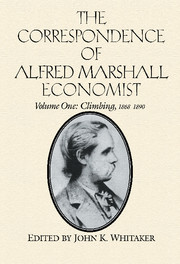Book contents
- Frontmatter
- Contents
- Acknowledgements
- General Introduction
- Editorial Practices
- Alfred Marshall: A Sketch
- Abbreviations
- List of Manuscript Collections
- Biographical Register
- Chronology 1842–1890
- List of Letters Reproduced in Volume 1
- LETTERS 1–332
- Appendices
- I Alfred Marshall's Family
- II Marshall's Testimonials for the Principalship of University College Bristol, June 1877
- III Foxwell's Initiative
- IV The 1889 Debate on Reform of the Moral Sciences Tripos
III - Foxwell's Initiative
Published online by Cambridge University Press: 29 March 2010
- Frontmatter
- Contents
- Acknowledgements
- General Introduction
- Editorial Practices
- Alfred Marshall: A Sketch
- Abbreviations
- List of Manuscript Collections
- Biographical Register
- Chronology 1842–1890
- List of Letters Reproduced in Volume 1
- LETTERS 1–332
- Appendices
- I Alfred Marshall's Family
- II Marshall's Testimonials for the Principalship of University College Bristol, June 1877
- III Foxwell's Initiative
- IV The 1889 Debate on Reform of the Moral Sciences Tripos
Summary
As the Marshalls left Bristol in October 1881, Herbert Somerton Foxwell approached Charles Taylor [58.3], the new Master of St John's College, about the possibility of a lecturing appointment for Marshall. The initiative seems to have come to nothing, but FoxwelPs two letters, reproduced below, are very illuminating.
St. John's College, | Cambridge.
Oct. 6. 1881.
My dear Master
I believe you know that Mr. Marshall has been obliged to resign the Principalship of University College Bristol, because the state of his health makes it impossible for him adequately to discharge those more external & active duties which are just now the most important ones attaching to the office.
The consequence is that he finds himself obliged to depend entirely for support upon his private means. Speaking without exact information, I believe these means to be small, & certainly not such as it is seemly that so able & deserving a member of our body should be compelled to exist upon, if it is reasonably possible for us to enlarge them.
I am well aware that this is in many respects, to which I need not further allude, a very unfortunate time to make any proposal implying a new charge on the College income. But I think this is a case in which, if the money can possibly be spared, the College may by a small expenditure not only sensibly improve the position of one of its late fellows engaged in research of first rate importance, but also do a great service, indirectly perhaps even more than directly, to economic & historical teaching in the University.
- Type
- Chapter
- Information
- The Correspondence of Alfred Marshall, Economist , pp. 360 - 362Publisher: Cambridge University PressPrint publication year: 1996



